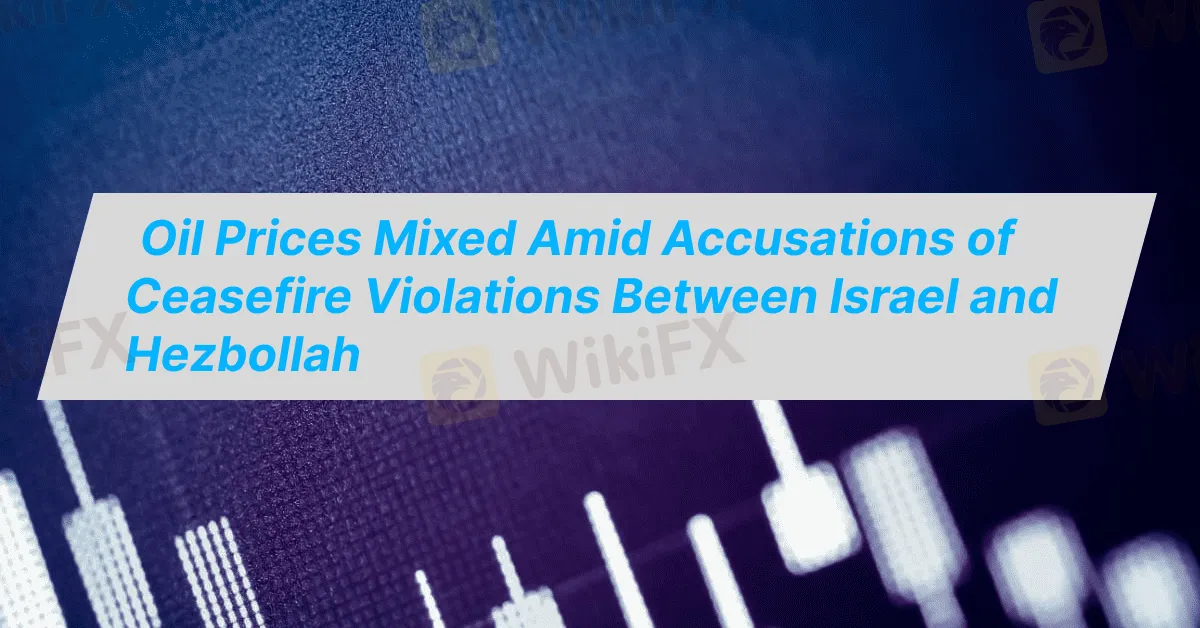Oil Prices Mixed Amid Accusations of Ceasefire Violations Between Israel and Hezbollah
Abstract:According to the report, Oil prices were mixed on Friday, with concerns over potential supply risks resurfacing following accusations from both Israel and Hezbollah regarding violations of their ceasefire. Investors are also awaiting a decision on OPEC+ output policy, as a delay to the group’s meeting adds uncertainty to the market.

According to the report, Oil prices were mixed on Friday, with concerns over potential supply risks resurfacing following accusations from both Israel and Hezbollah regarding violations of their ceasefire. Investors are also awaiting a decision on OPEC+ output policy, as a delay to the groups meeting adds uncertainty to the market.
By 02:32 GMT, Brent crude futures had dropped 7 cents, or 0.1%, to $73.21 per barrel. In contrast, U.S. West Texas Intermediate (WTI) crude futures rose by 38 cents, or 0.55%, to $69.10 compared to Wednesdays close.
Market trading was subdued due to the Thanksgiving holiday on Thursday, which resulted in the closure of U.S. financial markets.
On Thursday, Israel and Hezbollah exchanged accusations over alleged violations of their ceasefire, which had come into effect the day before. Initially, the ceasefire had appeared to alleviate fears of broader conflict and potential disruptions to oil supplies in the region. Despite these tensions, oil flows from the Middle East have remained largely unaffected by the ongoing conflicts between Israel and Hezbollah in Lebanon, as well as Hamas in Gaza.
Meanwhile, Russia launched a second attack this month on Ukrainian energy facilities, raising concerns over the risk of retaliatory actions that could impact Russian oil supplies. ANZ analysts noted that the escalating situation could disrupt oil production in the region.
Adding to the uncertainty, OPEC+—the coalition of OPEC members and their allies, including Russia—delayed its upcoming policy meeting to December 5th from the previously scheduled December 1st to avoid a conflict with another major event. Market expectations are that OPEC+ will extend its production cuts during the meeting.
In Iran, the country informed the United Nations nuclear watchdog of plans to install more than 6,000 additional uranium-enriching centrifuges at its nuclear facilities. Goldman Sachs analysts warned that if Western powers ramp up sanctions enforcement on Iranian oil exports, the country could see a reduction in crude oil production by up to 1 million barrels per day in the first half of next year.

Read more

ED Exposed US Warned Crypto Scam ”Bit Connect”
The Indian Enforcement Directorate (ED) recently exposed a crypto Scam from a firm called Bitconnect. During the investigation, which took place on February 11th and 15th, 2025. The authority recovered bitcoin worth approximately Rs 1,646 crore & Rs 13.50 Lakh in cash, a Lexus car, and digital devices. This investigation was conducted under the provisions of the Prevention of Money Laundering Act (PMLA) of 2002.

XTB Secures Chilean License, Expands Latin America Footprint
XTB gains a securities agent license in Chile, boosting its Latin America presence. The broker plans to offer stocks, ETFs, and derivatives to local investors.

Why Do You Keep Blowing Accounts or Making Losses?
For many traders, consistent losses can feel like an inevitable part of the journey. Some blame the market, others point fingers at brokers, and many convince themselves that luck simply isn’t on their side. But the reality is that repeated trading losses are rarely down to bad luck alone. Instead, a mix of psychological, emotional, and technical factors often leads traders down the path of blown accounts and frustrating setbacks. Understanding these deeper issues is key to breaking the cycle and becoming a more resilient and strategic trader.

eToro Adds ADX Stocks to Platform for Global Investors
eToro now offers stocks from the Abu Dhabi Securities Exchange, giving global investors access to leading UAE companies in sectors like energy, finance, and healthcare.
WikiFX Broker
Latest News
Pi Network Mainnet Launch: Game-Changer or Crypto Controversy?
GlobTFX Users Report Same Issue! But Why?
Rate Cut or Not? It Depends on Trump’s Policies
Why Do You Keep Blowing Accounts or Making Losses?
eToro Adds ADX Stocks to Platform for Global Investors
B2BROKER Launches PrimeXM XCore Support for Brokers
Germany's Election: Immigration, Economy & Political Tensions Take Centre Stage
WikiFX Review: Is IVY Markets Reliable?
WikiFX Community Creator Growth Camp
Effect of Tariffs on Gold and Oil Prices
Rate Calc

